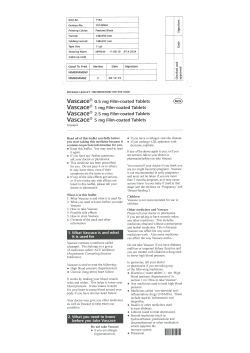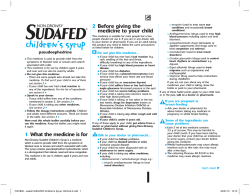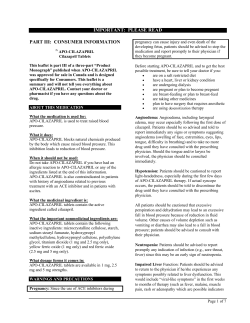
PACKAGE LEAFLET: INFORMATION FOR THE USER ROLETRA 10 MG TABLETS (Loratadine)
PACKAGE LEAFLET: INFORMATION FOR THE USER ROLETRA 10 MG TABLETS (Loratadine) Read all of this leaflet carefully before you start taking this medicine. - Keep this leaflet. You may need to read it again. - If you have any further questions, ask your doctor or your pharmacist - This medicine has been prescribed for you. Do not pass it on to others. It may harm them, even if their symptoms are the same as yours. - If any of the side effects gets serious, or if you notice any side effects not listed in this leaflet, please tell your doctor or your pharmacist In this leaflet: 1. What Roletra Tablets are and what they used for 2. Before you take Roletra Tablets 3. How to take Roletra Tablets 4. Possible side effects 5. How to store Roletra Tablets 6. Further information 1. WHAT ROLETRA TABLETS ARE AND WHAT THEY USED FOR Roletra Tablets contain loratadine. Loratadine belongs to the class of medicines called antihistamines. It works by blocking a substance in the body called histamine. This helps to decrease allergy symptoms. Roletra Tablets are used: − To relieve symptoms associated with allergic rhinitis (hay fever, allergy to dust mites .etc.) such as sneezing, runny or itchy nose and itchy, red teary eyes with burning or itching. You may be suffering from these symptoms all year round or only for some part of the year. − To relieve the swollen, red, itchy patches of skin caused by prolonged episodes of skin rashes or hives (chronic idiopathic urticaria). 2. BEFORE YOU TAKE ROLETRA TABLETS Do not take Roletra Tablets if: You are allergic (hypersensitive) to loratadine or to any of the tablet ingredients listed at the end of the leaflet (An allergic reaction may include skin rash, itching, swelling of face, lips, or hands/feet or breathing difficulties) You are pregnant You are breast-feeding currently Take special care with Roletra Tablets and talk with your doctor if: • You suffer from severe liver disease • You suffer from kidney disease Please inform your doctor even if these statements were applicable to you at any time in the past. This medicine may interfere with the results of certain tests for skin allergy. Make sure that your doctor or nurse knows about your medicine. You will need to stop taking Roletra tablets at least 48 hours before you undergo any such tests. Taking other medicines Please inform your doctor or pharmacist if you are taking, or have recently taken, any other medicines, even those not prescribed but bought/obtained without a prescription. Taking Roletra Tablets with food or drink The tablet should be swallowed whole with a glass of water. Roletra tablets may be taken with or without food. Avoid alcoholic beverages until you have discussed their use with your doctor. Pregnancy and breast-feeding You should not take Roletra Tablets if you are pregnant, you think you might be pregnant or you are planning to become pregnant; or if you are currently breast-feeding. Ask your doctor or pharmacist for advice before taking any medicine. Driving and using machines Roletra Tablets may cause drowsiness or disturbances in vision in some people. These may affect your ability to drive and use machines. Make sure you know how you react to your medicine before you drive, use machines, or engage in any other activity that could be dangerous if you are not alert. Important information about some of the ingredients of Roletra Tablets Your medicine contains small quantities of inactive ingredient called lactose. If you have been told by your doctor that you are lactose intolerant (galactose intolerance, the Lapp lactase deficiency or glucose-galactose malabsorption) or have an intolerance to some sugars, contact your doctor before taking this medicinal product. 3. HOW TO TAKE ROLETRA TABLETS Always take Roletra Tablets exactly as your doctor has told you. You should check with your doctor or pharmacist if you are not sure. Roletra Tablets should be swallowed whole with a drink of water. Dosage Adults and children above 6 years of age with weight more than 30 kg: the usual recommended dose is one Roltera Tablet (containing 10 mg of loratadine) per day. If you are elderly, your dose will remain the same as that for adults. Roletra Tablets are not suitable for children less than 6 years of age and children with weight less than 30 kg. Children 2 to 5 years of age should be given a dose of 5 mg loratadine per day. Patients with severe liver or kidney impairment Your doctor will decide your dose based on your liver or kidney function. You will be given Roletra Tablets with a lesser frequency than the usual dose for adults. The usual recommended dose in patients with severe liver impairment or kidney impairment is one Roltera Tablet (containing 10 mg of loratadine) given every other day. Children with bodyweight less than or equal to 30 kg with severe liver or kidney disease should be given a 5 mg dose of loratadine on alternate days. If you take more Roletra Tablets than you should Consult your doctor or go to the nearest hospital casualty department immediately. Take this leaflet or some capsules with you so your doctor will know what you have taken. If you forget to take Roletra Tablets Take them as soon as you remember. However, if it is almost time for your next dose, skip the missed dose and go back to your regular dosing schedule. Do not take a double dose to make up for forgotten individual doses. It is best to take your medicine at the same time each day as this will help you remember taking it regularly. If you stop taking Roletra Tablets Take your tablets as directed and for as long as directed; do not stop them, even if you feel better, as otherwise the symptoms may return. If you have the impression that the effect of Roletra Tablets is too strong or too weak, or if you have any further questions on the use of this product, talk to your doctor or pharmacist. 4. POSSIBLE SIDE EFFECTS Like all medicines, Roletra Tablets can cause side effects, although not everybody gets them. The following side effects have been reported: Very serious side effects If any of the following happen, stop taking Roletra Tablets and tell your doctor immediately or go to the casualty department at your nearest hospital. Rashes, hives, itching, chest constriction, shortness of breath or swelling of face, lips, hands/feet, fever, enlarged glands in the armpit, neck and/or groin • Severe skin reactions with blisters, sores or ulceration. These are very serious side effects. If you have them you may have had a serious allergic reaction or other type of reaction to your medicine. You may need urgent medical attention or hospitalization. • Serious side effects Tell your doctor immediately or go to the casualty department at your nearest hospital if you notice any of the following: These side effect shave been reported rarely. • Yellowing of skin and whites of eyes with decreased appetite, abdominal pain (these may be manifestations of a liver problem) • • Rapid thumping or pounding sensation in the chest with or without chest pain, breathlessness, fainting or fatigue Fits/ convulsions. Other side effects Tell your doctor if you notice any of the following: Most frequently reported side effects are headache, excessive sleepiness or trouble sleeping, increased appetite and dryness of mouth. Other side effects that have been reported are: Abnormal, involuntary blinking or spasm of the eyelids, eye pain, increased or decreased tears and blurred vision • Earache, ringing in the ears • Pins and needles sensation, change in sensitivity to touch • Flushing of face, generalised feeling of being unwell, fever, fainting, increased sweating • Back pain, chest pain, leg cramps, muscle pain, joint pains, Uncontrolled shaking (tremors), rigidity of muscles • Difficulty in speaking • Weight gain • Increased or decreased blood pressure, awareness of heart beat, fast heart beat • Feeling sick (nausea), being sick (vomiting), loose stools (diarrhoea) or constipation, indigestion, wind, hiccups • Change in taste, increased or decreased salivation, increased thirst, increased or decreased appetite • Sore mouth, toothache • Dizziness, nervousness, restlessness, loss of memory, anxiety, confusion, depression, difficulty in concentrating, irritability • Impotence, decreased libido • Breast pain, excessive bleeding during menstruation or pain during menstruation • Irritation and/or inflammation of the vagina • Cough with/ without production of sputum, blood in sputum, breathlessness, difficulty in breathing • Sore throat, inflammation of sinuses • Bleeding from the nose, nasal dryness, sneezing • Dry skin, itching, hives and rash, dry hair • Redness, discolouration, itching or hives on skin when exposed to sunlight • Change in urination, change in color of urine, inability to hold urine • The following side effects have been reported rarely: • Loss of hair • Swelling of hands/ feet, arms/legs etc. • Increase in size of breasts Laboratory tests There may be changes in the results of certain laboratory tests: • Abnormal liver function tests If any side effect gets serious, or if you notice any side effect not listed in this leaflet, please tell your doctor or pharmacist. 5. HOW TO STORE ROLETRA TABLETS Keep out of the reach and sight of children. Do not use Roletra Tablets after the expiry date which is stated on the label after (EXP). The expiry date refers to the last day of that month. Keep in orginal packing util use. Medicines should not be disposed of via wastewater or household waste. Ask your pharmacist how to dispose of medicines no longer required. These measures will help to protect the environment. 6. FURTHER INFORMATION What Roletra Tablets contains − The active substance: each tablet contains loratadine 10 mg. − The other ingredients are lactose monohydrate, pregelatinised maize starch, magnesium stearate and purified water. What Roletra Tablets look like and contents of the pack Roletra 10 mg Tablets are white to off white, round, uncoated tablets debossed with “R” on one side and "10" on the other side Roletra Tablets are packed in blister strips comprising of PVC film coated uniformly with PVdC on the inner side with a backing of aluminium foil coated with heat seal lacquer with a pack size of 10 tablets per strip and 3 such strips enclosed in a cardboard carton.. Marketing Authorisation Holder Manufacturer: Ranbaxy Laboratories Limited, Paonta Sahib, Dist. Sirmour, Himachal Pradesh - 173025. This leaflet was prepared in August 2007 While taking your medicine As with all medicines, Roletra Tablets 10 mg can occasionally cause side effects in some patients. You must stop taking Roletra Tablets 10 mg immediately and consult your doctor if you develop an allergic reaction to this medicine. An allergic reaction may include skin rash or eruptions, itching, swelling or breathing difficulties. Some patients may develop nausea, fatigue, headache, dryness of the mouth, nose and throat, and hair loss; these have been reported rarely with loratadine use. These side effects are generally non-serious and may go away on their own, however, check with your doctor if they continue or are bothersome. In addition, rare side effects that have been reported in association with loratadine, but where definite relationship with the medicine has not been established are rapid heartbeat and fainting episode(s). Do inform your doctor as soon as possible in case any of these problems occur. If you notice any unwanted effects not mentioned in this leaflet or if you are unsure about the effects of this product, please inform your doctor.
© Copyright 2025





















